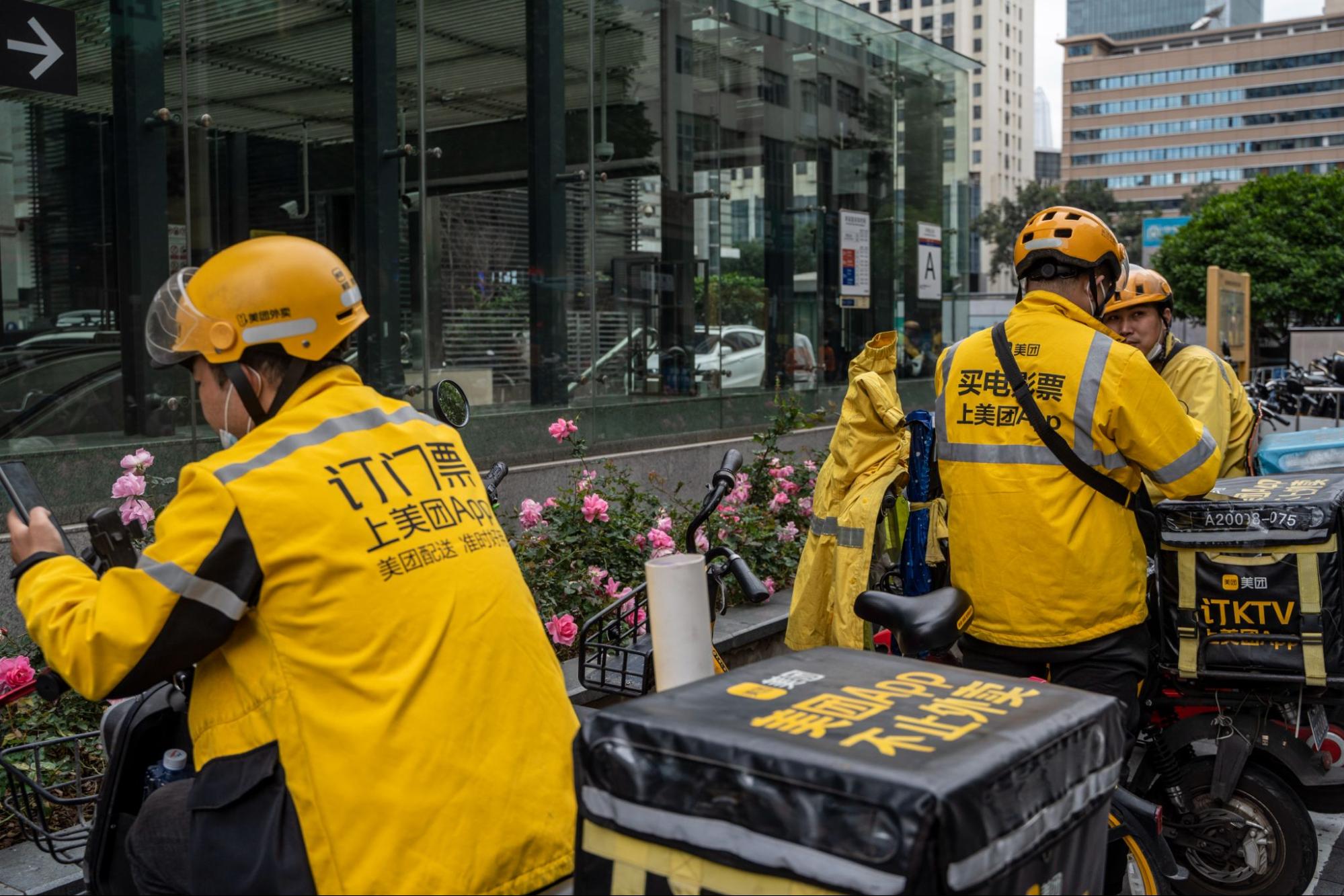Meituan couriers go on strike in Shanwei
The latest reminder of how Chinese food delivery apps continue to exploit their employees.

In a rare display of collective defiance among China’s gig workers, hundreds of food couriers for takeout behemoth Meituan in Shanwei, a city in the southern province of Guangdong, walked off the job last week to demand fair wages and other improvements in the workplace.
Meituan’s response was to call in employees from neighboring cities, who have been enticed to relocate with the promise of better benefits.
The coordinated effort started a week ago, after heavy rainfall in Shanwei resulted in an increase in takeout orders. Despite the bad weather and increased risks associated with driving in wet conditions, Meituan didn’t add extra minutes to the estimated time for each delivery, causing many drivers to be financially punished for “underwhelming performance,” the striking workers alleged. To make the situation worse, Meituan recently lowered earnings for its couriers per delivery and canceled additional allowances for working in extreme weather.
Before resorting to striking, a contingent of Meituan bicyclists in Shanwei tried to negotiate with their managers and ask for time off, citing concerns about safety on the road. But their requests were turned down; the company also penalized them 50 yuan ($7) for each day of absence.
Frustrated and disappointed by Meituan’s handling of the situation, a loose network of its employees in Shanwei stopped showing up for work last week. The defiant message quickly spread across the city, with hundreds of couriers joining the demonstration.
Meituan sought to control the crisis
So far, Meituan hasn’t issued any statements regarding the situation. But it was quick to contain the crisis — at the cost of serious disruptions in Shanwei.
On April 21, videos emerged on Chinese social media showing trucks full of workers in Meituan uniforms arriving in Shanwei. According to screenshots circulated online that appear to be conversations between recruiters and Meituan couriers, the people in the clips are mostly from Meizhou, Shantou, and Heyuan — cities adjacent to Shanwei — who agreed to relocate after being promised complimentary accommodation, a minimum wage of 200 yuan ($29) per day, and 10 yuan ($1.5) per delivery — a rate that’s more than double how much local couriers were previously paid.
Meituan started closing accounts owned by employees who haven’t clocked in for days. The punishment reportedly caused a rift among the strikers, with some of them returning to the job.
Founded by Wáng Xīng 王兴 and launched in 2010 in Beijing, Meituan initially was a Chinese Groupon clone, offering discounts and group buying. In 2015, Meituan completed a $15 billion merger with rival Dianping, akin to U.S. online review firm Yelp, and made an aggressive entry into the meal delivery business. Backed by Chinese technology and entertainment conglomerate Tencent, Meituan is currently the largest food delivery company in China, with an estimated 70% market share and a workforce of four million couriers across the country.
“Given the market size of Meituan, it is reluctant to accommodate the striker demands, which would send an encouraging signal to other couriers,” Zhongjin Li, an assistant professor of economics at the University of Missouri-Kansas City, told The China Project.
Li, who co-edited the 2016 book China on Strike: Narratives of Workers’ Resistance, which sheds light on labor struggles in Chinese factories through firsthand accounts, added, “Labor cost is the largest category in Meituan’s cost structure, and it is in Meituan’s interest to control it so the company can compete with other food delivery platforms and satisfy its investors.”
Longstanding problems
Dissatisfaction is common in China’s food delivery sector, as are sporadic strikes, according to Ya-Wen Lei, an associate professor of sociology at Harvard University, whose main areas of interest include economic sociology and labor movements. In a paper published in 2021 on China’s platform economy, Lei identified 87 instances of strikes and protests organized by Chinese food couriers between 2018 and 2019, which is likely to be “an underestimate,” she told The China Project.
According to the study, there are two types of food couriers in China: those who have labor contracts, regular hours, and human managers — often referred to as zhuānsòng 专送 — and those who are hired by independent agencies and whose work is mainly dictated by the app, commonly known as zhòngbāo 众包, gig or crowdsourced workers.
For workers under the second category, there’s a pattern of them being lured by high expectations of flexible schedules and handsome wages, but they tend to become dissatisfied quickly and resort to collective action as they deal with unstable incomes, shifting rules, and a lack of interaction with human colleagues and bosses at the job.
“As far as I know, the participating food delivery workers in the strike in Shanwei are crowdsourced couriers. Their income and working hours are contingent upon piece rates and subsidies, and a decrease in these rates can significantly impact their livelihoods,” Lei said. “In my research, I found that the most salient concerns of crowdsourced food delivery workers were decreasing piece rates. Many of them informed me that they have had to work an additional two or three hours every day to maintain the same income level as the piece rates decreased.”
Chinese food delivery apps have long exploited and mistreated their employees, but it was during the COVID-19 pandemic — when deliveries became a lifeline to home-confined city residents — that the plight of food couriers burst into public consciousness.
In 2020, Chinese magazine Renwu published a brutal exposé on the insanely successful but ruthless food delivery business, revealing that riders are encouraged to risk their lives at work to meet employers’ insatiable appetite for optimal efficiency and maximized profits. The investigative piece dominated the Chinese internet for days, prompting an outpouring of public sympathy and renewing feverish calls for apps to reform. In response to the criticism, Meituan and its main competitor, Ele.com, vowed to make substantial changes in how they assess employees’ performance and improve benefits for them.
A year later, the Beijing Zhicheng Migrant Workers Legal Aid and Research Center (BZMW), a nonprofit organization established in 2005 to provide legal assistance to low-income workers, released a damning report into the complex legal structure of Chinese delivery apps, accusing them of evading legal obligations to their drivers by classifying them as crowdsourced workers, who are recruited as contractors through third-party agencies and deprived of benefits and protections enjoyed by full-time employees, such as minimum-wage requirements, overtime rules, unemployment insurance, and injury compensation. Facing a backlash, Meituan and Ele.com apologized and pledged to treat its couriers with “more care and protection.”
But the promises seem to be unfulfilled. “Like other platform companies, Meituan and Ele.me are profit-oriented. The working conditions and compensation of delivery workers are likely to improve only if the Chinese government permits bottom-up organization and mobilization for workers,” Lei said. “Although the central government enacted two major administrative guidelines on labor protection in 2021, it has not severely punished any tech companies due to labor issues, unlike its multiple regulatory actions related to antitrust, financial risks, and national data security.”
Li pointed out that because China’s economic recovery from COVID-19 has been slow, and that the job market has been bleak, with a barrage of news about layoffs, closings, and cost cuts, the high unemployment has given companies an upper hand in recruiting and emboldened them to treat workers like disposable objects.
“Workers have much weaker bargaining power vis-à-vis the platform companies,” Li said. “The intense competition among platforms, after conquering certain market shares, also tends to switch the platform’s focus to expanding to other businesses for a platform ecosystem, rather than treating couriers better to attract and retain more of them.”
The next step
With no government-enforced reforms in sight, Chinese food couriers are left with no choice but to keep pressing for changes through strikes. But because the authorities view collective action among workers as a potential threat to “social stability,” it is potentially dangerous to organize large campaigns.
In 2021, Chén Guójiāng 陈国江, a 31-year-old food delivery worker known online as Mengzhu, was detained by Beijing police for “picking quarrels and provoking trouble,” a broadly defined crime that is applied widely in China against dissidents and activists. Before his arrest, Chen frequently posted videos on social media, documenting the grueling working conditions faced by Chinese delivery drivers and exposing labor violations of their employers. He was also the face and the leader of an online community called “Delivery Knights Alliance,” an unofficial union that allowed members to air workplace grievances and discuss ways to organize collective action against powerful ecommerce companies.
Similar to Chen, many participants in the Shanwei strike and their supporters turned to social media to strengthen their power and solidarity. On Douyin, the Chinese sibling of TikTok, they told their stories and explained the situation, bringing attention to their causes and ensuring the public knows what they are fighting for. “The truth is: Meituan will never accommodate its workers’ needs. They have to adjust their own expectations,” a social media user called Xiǎo Cài 小蔡, who said she left Meituan due to low pay, explained in a video that has received more than 26,000 likes.
While the unrest has not been reported by mainstream Chinese news outlets, social media posts about it have struck a special chord with Meituan drivers in other areas, who have voiced their support for the strikers and denounced the strike-busters as scabs.
Eli Friedman, a professor at Cornell University who studies Chinese labor activism and politics, suspected that WeChat might also have played a role in the organizing of the strike. The couriers in Shanwei, he told The China Project, might not have met each other in person, but they are likely to be in the same WeChat group, where they “identified common sets of problems they had and coordinated strike activities.”
“Sometimes the strikes we saw were actually completely invisible. They didn’t gather in public and protest,” he added. “Everyone would sort of just say, ‘Let’s all sign out of the app’ during lunch hour, which is a particularly busy moment and can inflict a fair amount of damage.”
Against a behemoth like Meituan, the striking workers in Shanwei might have to prepare for the worst. “I suspect that the strike may be gradually losing momentum if Meituan can ensure a steady supply of couriers,” Lei said. “In my study of a series of strikes in Chongqing in 2018, Meituan did not recruit riders from neighboring cities. According to my interviewees in Chongqing, Meituan eventually increased the rate without acknowledging it. It’s possible that Meituan has since learned how to handle strikes more effectively.”
Echoing Lei, Friedman said it’s unlikely that the strike will grow bigger. “It’s already kind of at the limit where it’s broken through, particularly in the media landscape,” he said. It’s only a matter of time before “the provincial and likely the central government start paying attention to it and treating it as a question of social stability.”
“If things are not resolved pretty quickly, then you’ll begin to see security come in,” he added. “I’m sure censors are already working pretty hard to remove any indicators of this online. If it hasn’t been deleted yet, it will be very soon.”






